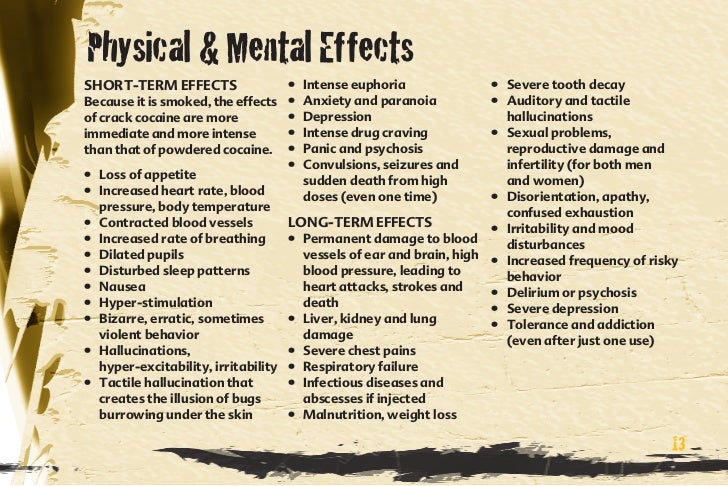고정 헤더 영역
상세 컨텐츠
본문
. Increased breathing rate. Uncharacteristic irresponsibility. Burns on fingers.
Cracked or blistered lips from smoking out of a hot pipeThe Alarming Availability of CrackConsidering how destructive the consequences of the drug are, the availability and widespread use of crack can be surprising.According to a survey conducted in 2010, children as young as 13 have been exposed to the drug. In fact, 23 percent of eighth-graders, 32 percent of tenth-graders, and 45 percent of twelfth-graders reported that crack was “fairly easy” or “very easy” to obtain. Considering that one hit can spark a lifelong addiction, these numbers help illuminate the severity of the issue. The Dangers of Crack CocaineOne of the greatest dangers of crack is its addictive potential. Crack forces a release of excess dopamine, the neurotransmitter that helps control the brain’s pleasure and reward centers.
As early as the first time you smoke crack, your brain has already started rewiring itself because it finds the resulting “high” pleasurable. Immediate Effects of Crack AbuseDue in part to the unpredictability of the drug’s contents, the effects of smoking crack can vary from person to person. Crack’s effects are both physical and psychological, and the severity increases the more a person smokes. Some immediate side effects of crack abuse include. Contracted blood vessels. Increased body temperature. Hyperexcitability.
Nausea. Intense euphoria. Intense cravings to use more. Bizarre behavior. Stroke. Heart failure. Potential death from respiratory failure.

“Coke bugs,” or the hallucination that bugs are burrowing under a cocaine or crack user’s skinLong-term Effects of Crack AbuseThe long-term effects of abusing crack can be detrimental. Long-term crack abuse can cause damage to most of the body’s vital organs, such as the liver, kidneys and heart. Additionally, crack cocaine users are more susceptible to infections because the drug compromises the immune system. The dangers of long-term crack abuse include. Recognizing a Crack Cocaine AddictionBecause of its potency and addictive quality, any amount of crack use should be cause for concern. Those addicted to crack put getting their fix above all else, including breaking the law. Knowing what to look for could save your life or the life of someone you care about. A few of the symptoms of addiction, as outlined in the Diagnostic and Statistical Manual of Mental Disorders (DSM-V) include ignoring responsibilities to use, tolerance, withdrawal, and using more than initially intended.Anyone exhibiting these symptoms may meet the clinical definition of crack cocaine addiction.
Get confidential help 24/7. Call now for:. Access to top treatment centers.
Mental Effects Of Cocaine
Caring, supportive guidance. Financial assistance optionsIntervention for a Crack Cocaine ProblemOnce it has come to light that someone is addicted to crack, the next step is to get them help. However, when a person’s brain has been reprogrammed to compulsively abuse crack, it isn’t always easy to convince them to start treatment.This is where an intervention can come in handy. Interventions are a good way to coax an addict into recovery.
Withdrawal from Crack Cocaine, Treatment and Next StepsSomeone seeking treatment for a crack cocaine addiction will experience symptoms of withdrawal within the first few hours after their last dose. The brain’s dependence on crack causes these symptoms because it can no longer function normally without the drug.The symptoms of crack withdrawal are predominantly psychological. Symptoms include fatigue, unusual sleep patterns and intense cravings.Professional treatment can help addicts cope with the symptoms of withdrawal and make a successful, lasting recovery.
Depending on the individual, treatment can range from outpatient therapy and support groups to an inpatient rehabilitation center. Treatment for crack addiction is a long road, but recovery is possible. Theresa is a Certified Addiction Professional (CAP), a Certified Behavioral Health Case Manager (CBHCM) by The Florida Certification Board, and a Certified International Alcohol and Drug Counselor (ICADC) by The International Certification and Reciprocity Consortium (IC&RC). Theresa is also a Certified Professional Life Coach and volunteers at a local mental health facility helping individuals who struggle with homelessness and addiction.
Theresa is a well-rounded clinician with experience working as a Primary Addiction Counselor, Case Manager and Director of Utilization Review in various treatment centers for addiction and mental health in Florida, Minnesota, and Colorado. She also has experience with admissions, marketing, and outreach. Eager to learn, Theresa is currently working on her Master’s Degree in Clinical Mental Health Counseling. As a proud recovering addict herself, Theresa understands first-hand the struggles of addiction. There is no limit to what Theresa is willing to do to make a difference in the field of Addiction!All of the information on this page has been reviewed and verified by a certified addiction professional.AddictionCenter.com is a referral service that provides information about addiction treatment practitioners and facilities.
How Crack Affects The Brain
AddictionCenter.com is not a medical provider or treatment facility and does not provide medical advice. AddictionCenter.com does not endorse any treatment facility or guarantee the quality of care provided, or the results to be achieved, by any treatment facility.
Benefits Of Crack

The information provided by AddictionCenter.com is not a substitute for professional treatment advice.




